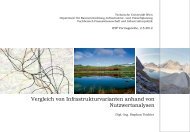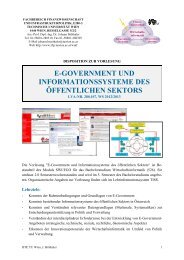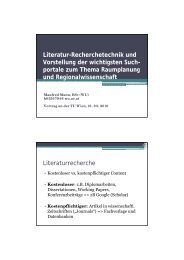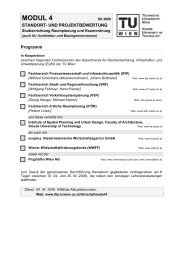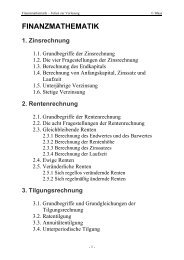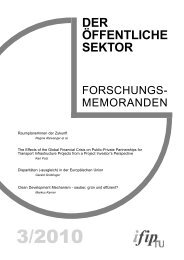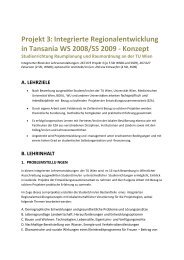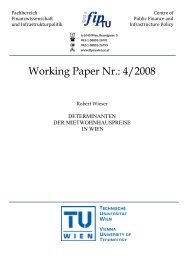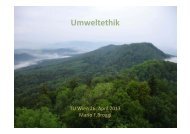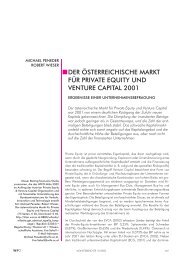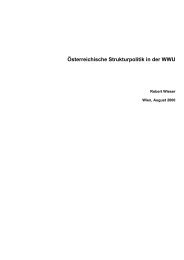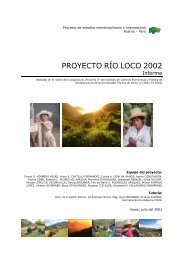Download as a PDF - CiteSeerX
Download as a PDF - CiteSeerX
Download as a PDF - CiteSeerX
You also want an ePaper? Increase the reach of your titles
YUMPU automatically turns print PDFs into web optimized ePapers that Google loves.
farmers. In England, recent policy within Defra h<strong>as</strong> been to use the ‘train the trainers’<br />
approach where workshops are used to train advisers and influencers who then p<strong>as</strong>s<br />
the message on to their clients. Such workshops invariably provide FACTS cpd<br />
points for the advisers who attend. This approach h<strong>as</strong> been used successfully in<br />
several recent campaigns such <strong>as</strong> raising awareness of organic manure management,<br />
promoting the latest fertiliser recommendations and explaining the English Action<br />
Programme for NVZ legislation.<br />
Where me<strong>as</strong>ures impact badly on farm profitability there are clearly implications for<br />
financial sustainability. In England, the recent implementation of the stewardship<br />
schemes <strong>as</strong> part of the England Rural Development Programme (ERDP) provides<br />
farmers with an opportunity to receive payment for following best practice me<strong>as</strong>ures.<br />
Those most relevant to pollution from nutrients in the Entry Level Scheme are nutrient,<br />
manure and soil management plans. Advice on each of these topics is currently being<br />
made available in regionally organised workshops under the Environment Sensitive<br />
Farming campaign (Carter, 2006).<br />
RESULTS<br />
Information Sources<br />
Several surveys have been carried out in recent years on farmers preferred source<br />
of information and advice. The British Survey of Fertiliser Practice (BSFP) (Goodl<strong>as</strong>s<br />
et al., 2002) found that 74% of farmers used their own judgement, b<strong>as</strong>ed on<br />
their knowledge and experience of their own farm when making decisions about<br />
fertiliser application rates. Information from advisers and consultants w<strong>as</strong> the next<br />
most common method (41%). A survey of farmers in NVZs (Scott et al., 2003) also<br />
found that the farmers own p<strong>as</strong>t experience w<strong>as</strong> regarded <strong>as</strong> the most important<br />
b<strong>as</strong>is for fertiliser decisions, but the use of agronomic consultancy and farm w<strong>as</strong>te<br />
management plans had incre<strong>as</strong>ed when compared with the start of designation.<br />
Agronomic consultancy, in particular, w<strong>as</strong> the source most frequently described<br />
<strong>as</strong> most useful in 2003 (in a 1996 survey, ‘p<strong>as</strong>t experience’ w<strong>as</strong> chosen by more<br />
farmers).<br />
In a 2004 survey, Chambers (2004) reported that RB209, MANNER and farmer<br />
meetings/conferences were the most commonly used sources of information and<br />
advice. Farmer workshops and on-farm demonstrations were also highly rated.<br />
Arable farmers (76%) made far more use of RB209 than gr<strong>as</strong>sland farmers (24%).<br />
Farmers, and in particular arable farmers (56%), made frequent use of independent<br />
consultants. Consultants used a wide range of information sources, including trade<br />
representatives. The farming press, although frequently used, w<strong>as</strong> not well regarded<br />
<strong>as</strong> a source of credible technical information by either farmers or consultants. They<br />
rated one-to-one advice <strong>as</strong> the most effective means of communicating nutrient<br />
management information. Workshops/courses, local farming events/conferences<br />
and booklets/leaflets were all highly regarded communication vehicles. Around<br />
80% of arable farmers and 70% of gr<strong>as</strong>sland farmers had made use of IT systems<br />
– although the survey datab<strong>as</strong>e w<strong>as</strong> skewed towards software users. IT systems<br />
were highly regarded, with c. 80% of arable farmers and consultants, and c. 75% of<br />
gr<strong>as</strong>sland farmers regarding them <strong>as</strong> either effective or very effective.<br />
182





